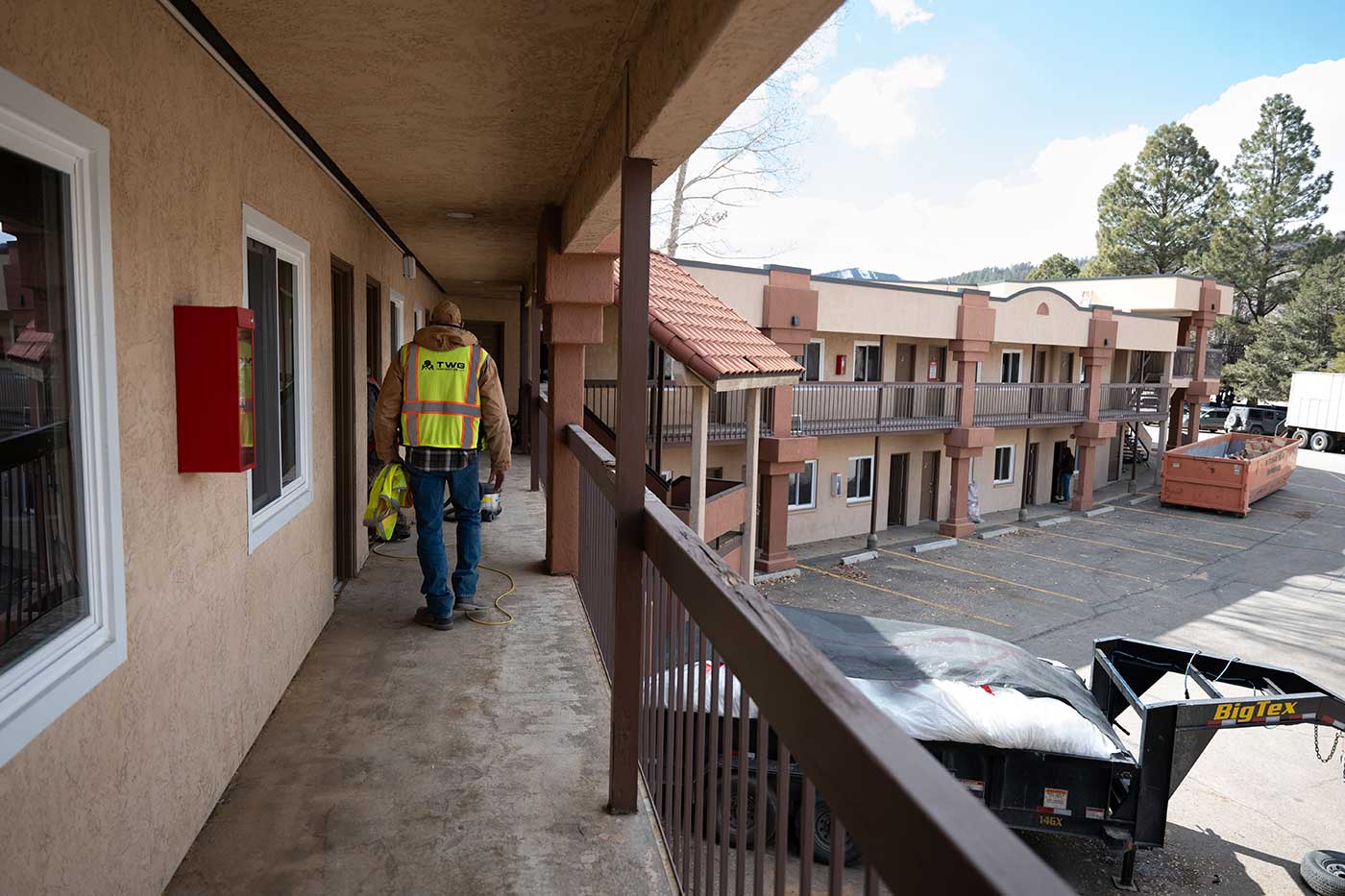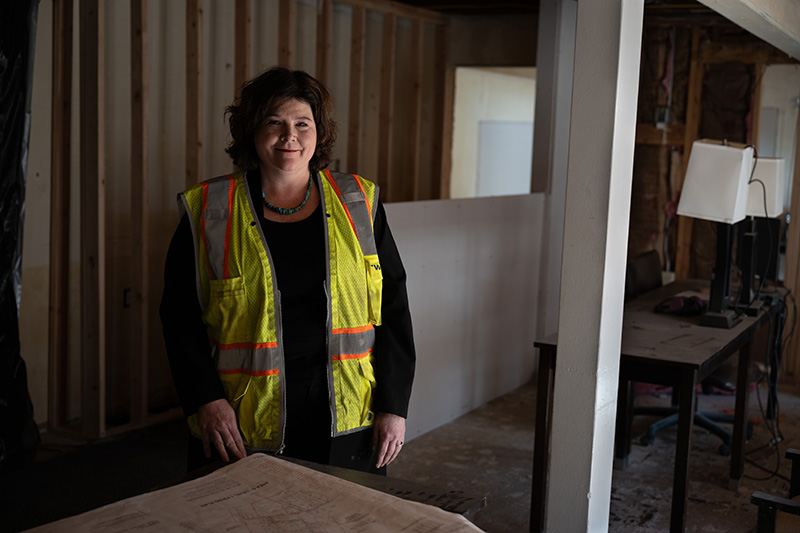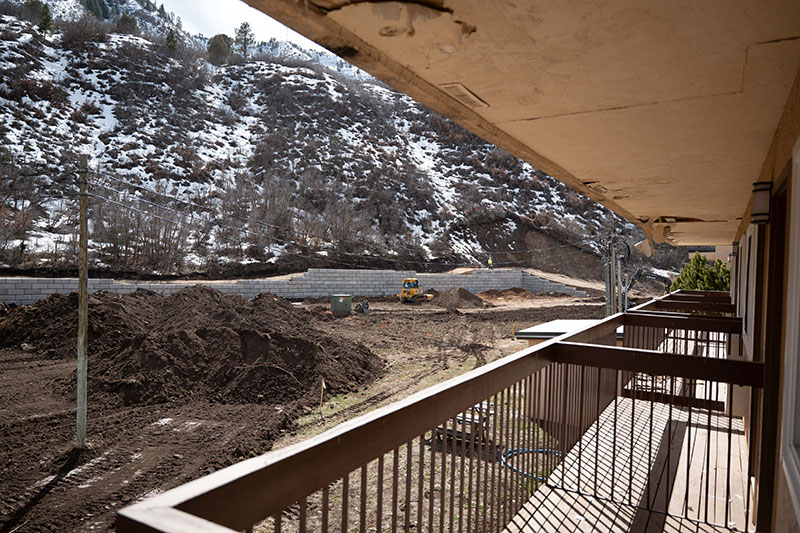
The Residences at Durango will include 120 affordable housing units across three buildings at the site of a former motel a mile from downtown Durango, Colo. Photo by Corey Robinson / Special to The Colorado Trust
The Residences at Durango will include 120 affordable housing units across three buildings at the site of a former motel a mile from downtown Durango, Colo. Photo by Corey Robinson / Special to The Colorado Trust
Giant plastic sheets seal off the hazard zones where asbestos abatement is in full swing. The swimming pool where travelers once lounged is buried under fresh fill. Kitchen appliances, new smoke detectors, and media boxes for internet access are being added to each of the 72 rooms in the former roadside inn. Plumbers are fitting new sink drains. A new community room, laundry facility and fitness center are being readied off the main entry. Saws buzz, hammers pound, and a giant Volvo L60H loader kicks up dust as it makes runs to fill the foundation where a new general store will rise.
Two new structures are going up behind this former Best Western motel a mile west of downtown Durango along Highway 160. They will be home to 24 two-bedroom and 24 three-bedroom apartments, rounding out the complex, which will include another 72 units in the existing building. In all, from property acquisition to renovations and new construction, the project will cost $35.6 million.
When the work is complete, the Residences at Durango will open as the first hotel-to-residential conversion in the state to use tax credit financing, according to the Colorado Housing and Finance Authority. It will also provide 120 affordable, below-market rental units in one of the tightest housing markets in southwest Colorado.
Durango officials hope the teamwork and innovative thinking that went into the project will serve as a model for continued work on the city’s challenges with affordable housing.
“There were so many pieces to the puzzle that made this project work, and that required a significant amount of tenacity and thoughtfulness on the part of our staff,” says Durango Mayor Melissa Youssef. “Now we realize that we have to be innovative, we have to think out-of-the-box and our staff is really working hard to do that in order to create different types of housing options that are needed in our community.”
Mayor Youssef adds that affordable housing is at the “very top” of her list of priorities for the city.
Assembling the pieces of the financing puzzle took jigsaw-like attention to detail while juggling many components that all had to line up simultaneously. Eva Henson, Durango’s housing innovation manager, refers to the final package as a “multi-layered capital stack” that required “time and special expertise” to pull together.
The need is acute. A 2022 report from the Economic Development District of Southwest Colorado rated Durango as the second most expensive community in the five-county region, citing housing costs as the chief culprit. The calculation was based on the household income required to cover essentials. The report found that a family of four with two working adults would each need to earn $20.55 per hour to live affordably in Durango. (Twenty dollars per hour equals an annual salary of $41,600, or $83,200 for a household with two working adults.)
To ensure that the Residences at Durango meets its goals of providing affordable housing, rental agreements will only be offered to those who earn between 30% and 60% of Durango’s median household income, currently $76,177. Rents are expected to start at $500 monthly and go no higher than $1,300.
The expectation, says Mayor Youssef, is that the project will serve people like restaurant workers, teachers and other school district staff, daycare employees, retail workers, and others who are “very vulnerable” to housing market fluctuations. It will also help people live in the communities where they work and not have to commute from the likes of nearby Bayfield, Mancos or Farmington, N.M.
The repurposing of the 60-year-old Best Western Inn & Suites began in early 2021 when the owners put the property on the market. The for-sale notice caught the attention of Jenn Lopez, who heads a housing consulting firm in Durango called Project Moxie. Lopez has 23 years of experience working in the affordable housing industry. She also served for three years as director of homeless initiatives under former Colorado Gov. John Hickenlooper.

Jenn Lopez at the Residences at Durango construction site on March 6, 2024. Photo by Corey Robinson / Special to The Colorado Trust
Lopez and Nicol Killian, then assistant director of community development for the City of Durango, immediately recognized the opportunity to convert the roadside inn into a property that would meet the need for rental housing below the existing rates. They first sought approval and won a green light from the Durango City Council. Next, they approached the owners and asked for time to find a developer. The longtime owners, said Killian, understood the city’s housing challenges and were amenable to waiting.
Lopez had such property conversions on her radar because, in 2021, the Colorado General Assembly had passed legislation authorizing a federal program to use American Rescue Plan Act dollars for a variety of housing needs, including the concept of “renovating underutilized hotels, motels or other properties.”
Project Moxie reached out to 16 developers with a request for proposals. Only one firm responded: the Indianapolis-based TWG Development. The firm’s website proudly proclaims: “Everything we do is built on a single belief: Housing is a right for all.” TWG would design the renovation, manage the remodeling and new construction, own the property, and manage day-to-day operations once it was ready to start accepting tenants.
As the first project in Colorado using the Low Income Housing Tax Credit for a motel conversion, the project is being financed through tactics that include private activity bonds, proceeds from the sale of the 4% tax credits, below-market loans from the Colorado Housing and Finance Authority, and low-interest loans using federal dollars from the state Division of Housing.
Henson nailed down another $1 million through Colorado’s Department of Local Affairs’ Innovative Affordable Housing Strategies grant programs, and the city was awarded $3 million from congressional direct spending via U.S. Sens. Hickenlooper and Bennet. The City of Durango and Durango Fire Protection District also provided fee waivers. Private loans filled the remaining gaps.
However, as a private and for-profit developer, TWG couldn’t accept the grant monies directly without paying taxes. In consultation with TWG lawyers and Project Moxie, Henson developed the idea of routing the grants through the city, treating the money like a zero-interest loan. All the state and federal players signed off on the plan.
Henson says that other than the complex funding puzzle, “lessons learned” include the expensive requirements for upgrading fire detection and sprinkler systems to meet the code for permanent residential housing. The Colorado Department of Transportation also required new studies about how repurposing the site would impact traffic flow.
“Folks wonder why these projects take so much time and it’s because it’s not just a city project,” says Henson. “There are a lot of players and a lot of agencies involved.”
The renovated 72 units in the existing building are scheduled to open in November. The two new buildings, with 48 additional rentals, will open in March 2025. The combined 120 units represent about a third of the 310 units needed annually to meet unmet housing needs in the city, according to a 2021 needs analysis produced by Denver-based Roots Policy Research.

The Residences at Durango will cost an estimated $35 million. It is the first hotel-to-housing project in Colorado to rely on tax credit financing. Photo by Corey Robinson / Special to The Colorado Trust
While renovations and new construction continue in earnest at the Residences at Durango, the nonprofit Community Investment Alliance (which works closely with Project Moxie) recently had to pull the plug on a similar endeavor north of the city. That was a plan to convert an 80-year-old motel, The Adventure Inn, into temporary, transitional housing for families and older adults facing housing insecurity.
Lopez recently explained to the Neighbors in Need Interfaith Alliance (NINIA) coalition that the funding, both via grants and low-interest loans, did not come together. A $500,000 loan approved by La Plata County commissioners, even with a 1% interest rate, would have led to monthly payments of $15,000 starting next January. Community Investment Alliance could not make the numbers work.
The 17 NINIA members attending an early March briefing with Lopez expressed nothing but support for her explanation, though they were disheartened that the project didn’t come to fruition. NINIA is a network of churches and individuals working to support people experiencing homelessness and to find solutions for affordable housing in Durango. The group came together in 2019 after a harsh, snow-heavy winter left many unhoused people grappling with miserably cold conditions.
In 2022, the county closed an illegal camp called Purple Cliffs along the Animas River south of town, where about 250 people lived. NINIA continues to support those needing essential services, such as the “Laundry Love” service, which washes clothes for free for people with low or no incomes.
When asked about solutions to affordable housing and homelessness, Lopez talks about increasing the “intentionality” of city and county leadership and linking resources with goals and purpose.
“Where everybody’s aligned and you run with that alignment, you can get anything done,” says Lopez. “We’re really good at coming into a community and saying, ‘Here’s what we could do together.’ That’s kind of our magic.”